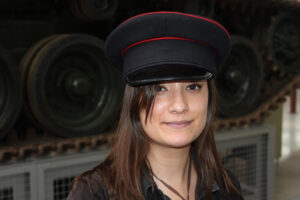My career story: Sarah Dixon

Job title and department or organisation
Sarah is a Senior Government Analyst at the Government Actuary’s Department (GAD). Her role matches the role of Data Analyst on the Analysis Function Career Framework.
Grade
Sarah works at Grade 7 level.
Profession and entry route
Sarah is an unaffiliated analyst.
She entered the Civil Service at Grade 7 level through as part of a departmental recruitment round.
Sarah’s career path
I graduated from university with a degree in Physics and I joined the Atomic Weapons Establishment (AWE), which is a Ministry of Defence (MOD) research facility. I joined as a Junior Analyst which would have been the equivalent to Civil Service Executive Officer (EO) grade. My role involved doing general analysis around operational elements which enabled me to use my physics degree. I was then promoted to Modelling Manager where I led a team and produced software and analysis for MOD.
After this role I decided to move to the private sector as a Project Manager at Scottish and Southern Electricity (SSE). The role still required analysis and I was looking at smart meters. I then applied to be a Data Scientist within the smart meter team, which gave me the opportunity to look at data SSE was collecting on smart meters. My role involved looking into how we could improve smart meter installation as well as supporting the migration to the new infrastructures. When Ovo and SSE merged, I was forced to move roles as part of the restructure, and I became a Senior Supply Chain Analyst. In this role I was looking at ordering and forecasting of smart meters.
In August 2021 I joined the Government Actuary’s Department (GAD) as a Senior Analyst at Grade 7. I am currently working on a mix of projects including the assumption setting for public sector pension schemes, model quality assurance, and analysis of client data. As a Senior Analyst my day-to-day activities vary a lot, but my main goals are to ensure analysis for clients is of high quality and that my colleagues develop their data skills. That involves me coaching less experienced colleagues in analysis, programming, visualisation, quality assurance, and machine learning. I also use all of these skills myself to do my work.
Because of the variety of projects that I work on, I spend a lot of time asking questions of Actuaries and other staff involved as I need to ensure I have understood the subject well enough to produce a suitable solution. I am also becoming more and more involved in the strategic elements of analysis like setting and communicating best practice, improving processes, and showcasing new techniques to the wider department.
The flowchart shows Sarah’s career progression from achieving a degree in physics to her current role as Senior Analyst. It shows the step-by-step journey Sarah has taken to achieve her current grade and experience. Enlarge the flowchart.
I get involved in variety of projects at GAD. Since I started, I have been working on the assumptions used for the public sector pension schemes project. We get analytical models which my team and I quality assure to make sure the models have been built to specification.
I am enjoying what I am doing now as there is so much variety. I like working in a role where I can support the development of other analysts and help them improve their coding or analysis. Any future roles I consider would need to give me the opportunity to continue supporting the career development of other analysts and share my expertise.
I am proud of the work I have done on The Assumptions Project, which is also called the Analysis of Experience (AOE). This was my first experience of pensions with no actuarial background. I was leading a team of junior and inexperienced analysts and we had to produce high quality outputs. We pulled together and completed the work in a tight timeframe. I was proud of how quickly I learnt on the job so I could support my team in their work, whilst also supporting their personal development. As a leader, I created a sense of camaraderie within the team, made sure everyone understood their roles, and kept up a good team morale. We also completed the work on time, so I am really proud of that.
In my role as Senior Supply Chain Analyst at SSE, we had significant supply chain issues in 2021 following the pandemic. A lot of our smart meters and their components come from overseas, so we relied on a global supply chain. If we ran out of smart meters the company would not be able to install them, which would mean they could be fined by Ofgem, so I had to find a solution. I was responsible for creating a plan and identifying where our stock was in a constantly changing environment. It was incredibly challenging with so many variants affecting the delivery of stock. I had to coordinate across multiple teams, talk to suppliers, and build a daily understanding of the evolving situation. I managed to get us to a good position, and we did not have to cancel any installations.
Sarah’s advice
It is important to remember that you will never know everything, no matter what grade you are. You need to ask questions and never be afraid to be honest if you do not know the answer. If you make a mistake, own up to it.
I think it is important at my grade and above to act as a role model and create an environment where it is okay to be authentically you. Encourage your team to speak up and not be afraid to ask questions.
This career story was published on Tuesday 1 August 2023.
